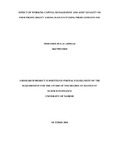| dc.description.abstract | The victory and survival of any firm depends largely on the systematic management of its working capital majorly the manufacturing sector that requires to adopt proper and effective management so as to increase the level of performance and increase the margin of contribution to the economic growth; the study is intended to examine the effect of working capital management and asset quality will have on firm profitability among manufacturing companies listed in NSE. The study was anchored on four major theories namely contingency, configurationally, risk-return trade off and asset profitability theories. The study utilized descriptive research design. The study targeted a population 10 manufacturing firms listed in Nairobi Securities Exchange as at 31st December 2015. Secondary data was used which was pulled from the companies audited income statements and statement of financial position posted in their respective website. This study used multiple linear regression analysis to decide the influence of working capital and asset quality management has on the outcome of a company. The study concludes that credit collection policy that facilitates low average collection period ensured the firms’ healthy cash flows and improved liquidity position, increase in inventory turnover period promotes the financial performance of firms listed in NSE, account payables plays a crucial function in the organization and coordination of working capital in that the postponement in the payment of bills is one among the techniques used by managers to source for non-expensive funds and that postponement of the payment of the payables due can be costly to the firm if its given a discount to settle its bills early. If the cash conversion cycle improves it will equally have an impact on the profitability of the firm by increasing it. Therefore cash conversion cycle current ratio explains a true picture of the effectiveness of a company's operating cycle and also its ability to convert the products of the company into cash in shorter period. The condition of assets is a crucial instrument to portray the power of the firm and deterioration of asset quality will seriously impacts on both the operating and financial capability of firms listed in NSE. Low debt ratio implies that firms have a chance to utilize leverage as a better way of growing the company while a greater percentage of debt-to-equity ratio explains that a firm may fail to initiate sufficient funds to meet its obligations when it’s due. Big companies enjoy greater favourable conditions such as enjoying economies of scale which gives better position enabling the company to produce efficiently; have more bargaining power to its advantage when dealing with both creditors and distributors or even clients. The study recommends that firms should create a credit collection policy setting out the procedures and practices to be used by the company to collect overdue or delinquent accounts receivable. This policy should allow for simultaneous use of a combination of several collection strategies that ensures that firm not only improves its cash flow by shortened average collection period but also does not suffer bad debt losses. Firms should maintain leverage ratio at a standard level. This is based on revelation that high debt can be risky to the firms and its investors as unchecked debt levels can push a company to credit unworthiness while at the same time small debt-to-equity ratios can portray an indication the firm is not utilizing the opportunity of the excess returns that are brought by the financial leverage. For asset quality, Firms need to improve their processes of screening debt management; manufacturing companies must look into their capital levels in bid to enhance their capital levels and as a result increase their financial performance. This will give the manufacturing firms an opportunity not to be exposed unprecedented financial failures, but to be in the front line to benefit from business opportunities as they arise and in the process improve their financial health | en_US |

